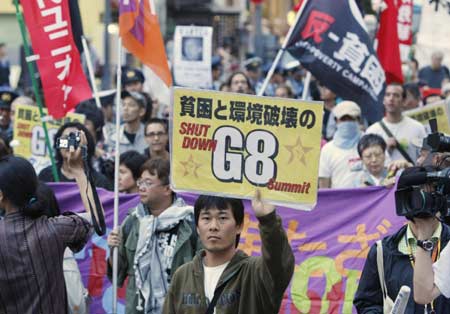
There is a certain current of anarchist thinking that is very particular about the way we perceive and define capitalism.
It takes special affront at propaganda that identifies capitalism with specific institutions or events, such as banks or the latest G8 summit. Capitalism, this current points out, is a matrix of economic and social relationships and not simply this or that building or group of people.
There is obviously some truth in this analysis and it would be dangerously superficial to focus exclusively on the public faces of capitalism without attempting any analysis of what it is, where it comes from and how it might be defeated rather than merely symbolically challenged.
However, this criticism – usually aimed at attempts to organise populist mass street action – is fundamentally flawed and wilfully ignores the fact that capitalism exists on many different levels and should therefore also be countered on many different levels.
In its most disembodied form, “capitalism” is nothing but a word, consisting of the shape of the letters that spell it out. Next, in order of descent towards the tangible, it is an abstract definition which would exist even if there were no capitalist societies anywhere on the planet (as was once the case and surely will be again!).
This is one of the levels that these particular critics tend to refer to, along with the next one down, which is the capitalist system actually in place, as it is in our times, with all the complexities it involves.
Clearly an important part of any anti-capitalist struggle will be the analysis and description of capitalism, in theory and in practice, and the discussion of alternatives – this is not something that would be disputed by anyone.
But capitalism also exists on less abstract levels of reality. It manifests itself in the real world in the shape of real companies which have real headquarters and are run by real people.
It also manifests itself in the form of the politicians who maintain its hegemony, and most noticeably when these politicians, heads of various capitalist states, come together publicly to present a common front at the various summits that are essentially propaganda initiatives on behalf of the status quo.
Opposing these manifestations of capitalism does not necessarily mean one has no understanding of the less tangible forms that capitalism takes, or that one mistakes buildings or men in suits for the phenomenon that we term capitalism.
Instead, protesters in the City of London or outside a G8 summit are choosing to counter capitalism on the levels at which it becomes obviously visible, deploying their own symbolism of protest and dissent against its equivalent symbols of power and control.
The same multi-layered reality applies to any political ideology or system. Fascism, for example, is also a word in the dictionary. It is also a political theory of sorts (though a rather incoherent one) and it has been, historically, a real form of social organisation and control.
Fascism was never exactly the same thing as the German or Italian governments in the 1930s, but it manifested itself, in a less pure and more worldly form, in those governments.
Fascism as a concept is not the same as the actual existing Golden Dawn party in Greece or the EDL or BNP in the UK, but it manifests itself in those organisations.
Would any anarchist ever argue that there is no point in protesting outside the HQ of one of these fascistic parties, or in mobilising against their marches or rallies, on the basis that fascism is a system rather than a building or an event? Is there any anarchist who would not understand that we have to be present on the same levels as fascism is present, in order to oppose it in whatever form it appears?
Again, if we lost track of the bigger picture and fixated on specific individuals or groups without understanding the context in which they arose, there would be ground for criticism, but this is not an inevitable by-product of choosing to challenge fascism in a specific manifestation.
Likewise, mobilising against bankers or G8 summits under the banner of anti-capitalism does not inevitably involve any lack of understanding of what capitalism is nor, indeed, preclude involvement in the struggle against capitalism on other levels, whether more abstract or more pragmatic.
The kind of analysis that is forever positing an “either/or” scenario (and of course insisting that its particular approach is the correct one!) does nothing to further the cause of anarchism.
Ours must be a holistic approach, operating simultaneously in microcosm and macrocosm, understanding that just as capitalism manifests in both abstract and tangible forms, so must we.
“We are everywhere” has a broader application than the merely geographic.
Leave a Reply